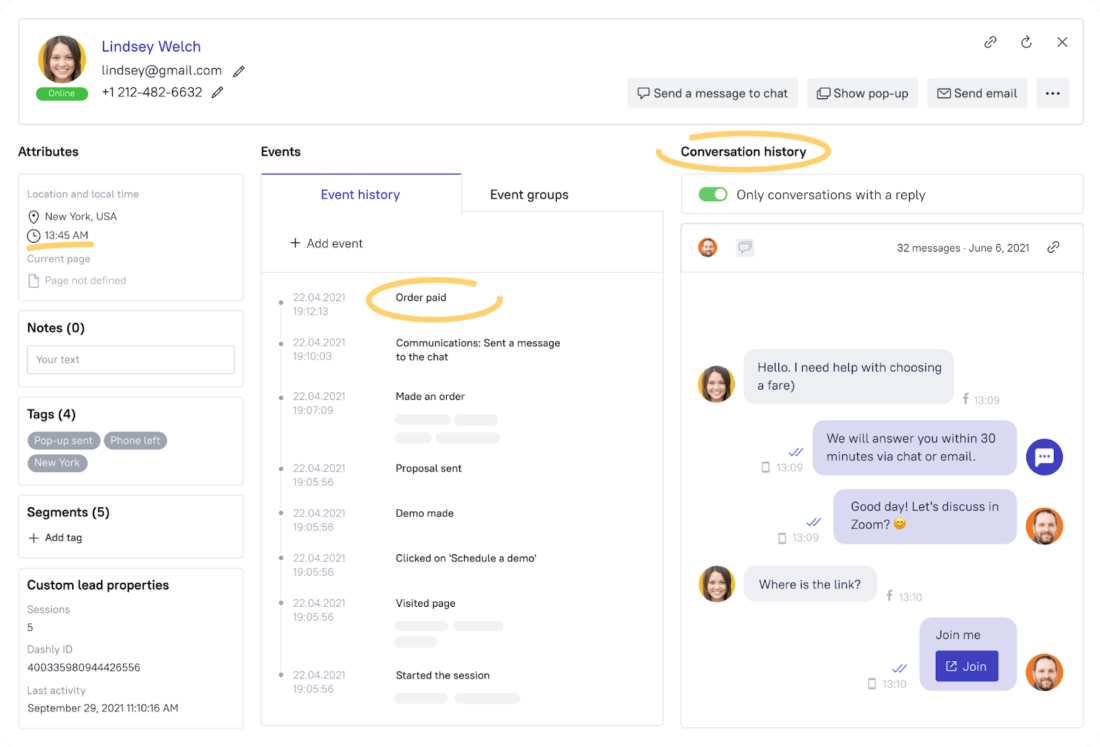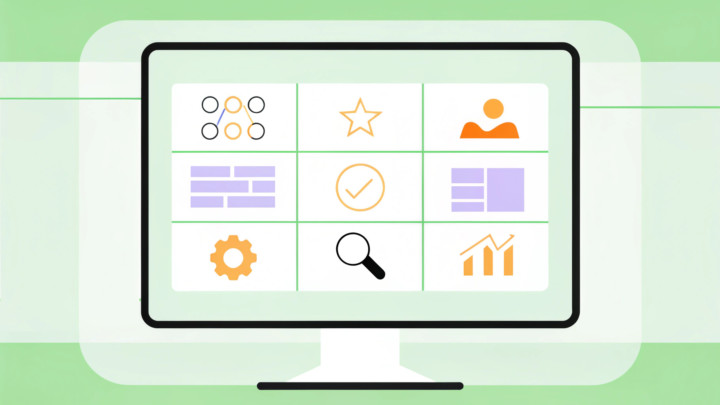Understanding CRM marketing automation: A step-by-step guide to implementation and use

Overview
Lead management can often be quite overwhelming, can’t it? With countless tasks to juggle, it’s easy to feel like you’re drowning in responsibilities. That’s where CRM marketing automation comes in. It’s not just a tool; it’s a lifeline that simplifies customer relationship management by automating those repetitive tasks that take up so much of your precious time.
Imagine enhancing client engagement and driving sales growth without the constant stress of manual processes. By integrating these tools, you can save time, reduce errors, and ultimately improve your operational efficiency. This means you can focus more on what truly matters — growing your business and connecting with your customers.
In today’s crowded marketplace, having the right support can make all the difference. You deserve a solution that makes your life easier, and CRM marketing automation is here to help. Embrace this opportunity to streamline your operations and give yourself the competitive edge you need. Remember, you’re not alone in this journey; we understand the struggles and are here to guide you toward a more efficient and successful business.
Introduction
In today’s competitive landscape, we understand that small businesses face numerous challenges daily. You’re not alone in feeling overwhelmed by the demands of marketing and customer engagement. That’s why many are turning to CRM marketing automation as a game-changing strategy to ease these burdens. This innovative approach uses technology to simplify marketing tasks, allowing you to focus on what truly matters: building meaningful relationships with your customers.
As AI and automation tools become more prevalent, it’s essential to recognize the benefits and best practices of CRM marketing automation. This understanding can be a lifeline for businesses like yours, helping you not just survive, but thrive. From overcoming implementation challenges to measuring success through key metrics, we’ll explore how you can harness the power of CRM marketing automation to drive growth and efficiency in your operations. The fix is simpler than you think, and we’re here to guide you every step of the way.
What is CRM marketing automation?
Running a small business can feel overwhelming, especially when it comes to managing customer relationships. This struggle is familiar — managing multiple tasks at the same time, trying to keep your clients engaged, and finding time to grow your business. But what if there was a way to simplify these challenges and make your life a bit easier?
CRM promotional process management is here to help. By strategically applying technology, you can automate repetitive tasks like email outreach, lead scoring, and audience segmentation. This not only saves you precious time but also allows you to focus on what truly matters: building strong relationships with your clients. In fact, 50% of promoters using automated tools do so daily, highlighting how essential this approach has become in today’s promotional landscape.
Imagine significantly enhancing your outreach efforts and boosting customer engagement — all while driving sales growth. For smaller marketing teams, this is particularly beneficial, especially when resources are limited. You can compete effectively in a crowded marketplace without feeling stretched too thin. Yes, the initial costs of integration can be daunting — averaging 3.5 times the annual license costs, as noted by Nucleus Research — but the long-term advantages are undeniable.
Looking ahead to 2026, the integration of AI in promotional processes is becoming more common. With 74% of advertisers anticipating that a significant portion of their tasks will be AI-driven, you can expect streamlined workflows and enhanced efficiency. Platforms like Dashly demonstrate how technology can elevate client interactions, allowing you to concentrate on growth while maintaining high standards of engagement.
You’re not alone in this journey. Embracing these tools can transform the way you manage your customer relationships, making your business more resilient and ready to thrive. Take that next step — explore how CRM promotional process management can work for you.

Key benefits of CRM marketing automation for small businesses
Running a small business is tough, and we understand the daily struggles you face. The use of CRM marketing automation can be a game-changer, helping to improve your operational efficiency and lead management processes. Imagine being able to enhance client interactions and analyze data more effectively. By automating routine tasks, you can save precious time and reduce human errors, allowing your team to focus on what truly matters — strategic initiatives that drive growth.
Did you know that 32% of sales representatives spend over an hour on manual data entry? That’s a significant inefficiency, but CRM technology can help you tackle this issue head-on. Furthermore, only 28% of organizations feel satisfied with their tools for creating a shared, centralized view of clients. This highlights the challenges many small businesses encounter when utilizing CRM systems. Fortunately, CRM marketing automation tools empower you to nurture leads more effectively through personalized communication.
For example, automated email campaigns allow you to follow up with leads in a timely manner, ensuring that your interactions are relevant and tailored to their needs. This level of engagement not only builds customer loyalty but also leads to higher conversion rates. With 50% of promoters using promotional tools daily, it’s clear that these resources are becoming essential for businesses aiming for success in 2025.
As you look ahead, consider that 50% of marketers expect seamless integration with current systems, while 45% are seeking lead qualification features. These insights underscore the vital role of CRM system management in addressing the needs of small enterprises. Additionally, 65% of marketers report successful execution of promotional strategies, demonstrating the effectiveness of these tools in enhancing overall promotional efforts. In summary, the impact of CRM marketing automation on lead management is profound, equipping marketing teams with the necessary resources to optimize operations and foster growth.
Now let’s figure out how to introduce CRM marketing automation in your current workflow.
Integrating CRM with marketing automation: A seamless approach
Integrating CRM marketing automation with promotional automation is essential for creating a seamless flow of data and communication between these systems. Tools in your tech stack shouold make your likfe easier, and managing multiple platforms is not easy at all. Dashly’s marketing automation tools simplify this integration, allowing businesses to effortlessly manage interactions across various touchpoints, such as website chat, email, and social media — all in one unified platform. With this capability, you can observe client interactions and deliver highly customized promotional initiatives tailored to individual behaviors and preferences.
Imagine this: when a lead engages with a marketing campaign, Dashly’s user behavior tracking automatically updates the lead’s status in the CRM. This triggers follow-up actions, like sending a personalized email or scheduling a call. This streamlined approach not only enhances the client experience with timely and relevant communications but also boosts the productivity of your marketing and sales teams. By providing comprehensive insights into client journeys, you can optimize your outreach efforts effectively.

Moreover, Dashly’s analytics features empower marketing managers to monitor your marketing campaigns performance across all channels. You can set benchmarks for response times and identify opportunities for improvement. As Technical Content Marketer Charlie Custer noted, Forrester Research has reported that utilizing automated processes can lead to a 10% increase in sales pipeline. Additionally, with 39% of B2B firms planning to introduce automated processes for social media management in the coming year, it’s clear that this trend is gaining momentum.
However, we recognize that 56% of advertisers have concerns about their firm’s ability to keep pace with technological innovations. This highlights the challenges that necessitate effective integration. Thankfully, Dashly offers over 30 integations that will help you fit it in your tech stack seamlessly. For instance, you can capture leads and manage communication with them within Dashly, but then hand them to Pipedrive to monitor their place in your sales funnel. This significantly improve the synergy between CRM marketing automation and promotional strategies. This integration is crucial for small enterprises, emphasizing the importance of merging CRM marketing automation with promotional technology to thrive in a competitive environment.

Discover CRm marketing automation with Dashly:
Best practices for implementing CRM marketing automation
Overall, working on your funnel is a real challenge, especially when it comes to effectively implementing CRM marketing automation processes. We understand the struggles you face daily, and it’s important to acknowledge that defining clear objectives for your automation efforts is a crucial first step. Whether you’re aiming to boost lead conversion rates or enhance customer retention, having specific targets can truly guide your implementation journey.
Did you know that a staggering 74% of marketers expect over a quarter of their tasks to be AI-automated by next year? This statistic underscores the need for targeted strategies as technology continues to evolve. Moreover, it’s noteworthy that 50% of advertisers who utilize automated tools engage with these resources daily, highlighting the importance of consistent interaction with these systems.
Equally vital is maintaining high-quality data. Regularly cleaning and updating your databases can prevent errors that might undermine the effectiveness of your marketing strategies. Remember, data quality is fundamental. A recent survey revealed that 90% of Chief Marketing Officers plan to leverage promotional technology tools, making data integrity essential for achieving successful outcomes.
Additionally, providing adequate training for your staff on CRM marketing automation and promotional technology tools is key. Training empowers employees to utilize these systems effectively, which can lead to improved performance across the board. As Charlie Custer, a Technical Content Marketer and Analyst, emphasizes, the effective use of automated processes can yield remarkable results, including a 10% increase in the sales pipeline, as noted by Forrester Research.
The rise of AI in promotional processes has surged by 250% in 2023, reflecting its growing significance in today’s business landscape. By investing in training, small enterprises can equip their teams to navigate the complexities of technology and drive better results. With these best practices in place, you can position your business for success in a rapidly changing promotional environment.

Overcoming challenges in CRM marketing automation adoption
Implementing CRM marketing automation can feel overwhelming for small enterprise owners. We understand that one of the biggest hurdles is often resistance to change; employees may find comfort in traditional methods. However, by clearly communicating the benefits of CRM marketing automation — like improved efficiency and enhanced customer engagement — you can help ease these concerns.
Involving your staff in the decision-making process not only fosters a sense of ownership but also makes the transition smoother. The financial benefits of adopting CRM marketing automation are compelling too; on average, organizations earn $8.71 for every dollar spent on these tools. This strong return on investment makes a powerful case for overcoming resistance.
Another challenge to consider is data integration, especially for businesses that rely on various systems. Ensuring these platforms communicate effectively is crucial for a seamless implementation. Additionally, providing ongoing support and training in CRM marketing automation is essential. Equipping your employees with the skills and confidence they need can significantly enhance their willingness to embrace change.
A 2018 study highlighted that 85% of CRM users in the US reported improved client experience as the primary benefit, underscoring the potential rewards of navigating these challenges. Furthermore, a 2021 study by Dun & Bradstreet revealed that 90% of Chief Marketing Officers planned to utilize CRM marketing automation by the end of the year. This trend signals a robust movement towards incorporating technology in promotional strategies across various sectors.

Measuring success: Key metrics for CRM marketing automation
Measuring success in CRM marketing automation can feel overwhelming, especially for small business owners. It’s essential to track key metrics like:
- Conversion rates
- Client acquisition costs
- Return on investment (ROI)
Regularly analyzing these metrics is crucial for evaluating how well your promotional campaigns and CRM marketing automation strategies are performing. For example, keeping an eye on conversion rates can provide valuable insights into how effectively your campaigns are turning leads into loyal clients.
Understanding client acquisition costs also sheds light on how well your spending on CRM marketing automation is working. With forecasts indicating that around 80-90% of businesses will adopt some form of marketing technology by the end of 2025, leveraging these metrics becomes increasingly vital. Moreover, the rise of personalized content — where tailored emails can generate 58% higher transaction rates than generic ones — highlights the importance of data-driven strategies.
As tech expert Krunal Vaghasiya notes, ‘Automation also helps nurture leads,’ emphasizing its role in the customer journey. Take, for instance, Dashly. As a conversational marketing platform, it effectively enhances lead capture, nurturing, and reactivation for small to medium-sized enterprises. And keeps the whole history of your interactions in lead cards, which you can later use for other marketing cmapaigns, personalized communication, and analytics. By leveraging this data, you can refine your marketing strategies through CRM marketing automation and improve overall performance, paving the way for sustainable growth in a competitive landscape. CRM marketing autmoation is aimed at helping you in this tricky journey of lead communication and conversion rate optimization.

Conclusion
Navigating today’s competitive landscape can be overwhelming for small businesses. We understand that managing repetitive tasks while trying to foster customer relationships can feel like an uphill battle. That’s where CRM marketing automation comes in, offering a transformative opportunity to simplify your operations and enhance customer engagement. By automating those tedious tasks, you can focus on what truly matters — building meaningful connections with your customers.
To maximize the benefits of automation, it’s essential to implement best practices. Start by:
- Setting clear objectives
- Ensuring your data quality remains high
We know that change can be daunting, and challenges like resistance to new systems can arise. However, fostering a culture of adaptability and providing the necessary training can significantly improve user adoption and effectiveness. Plus, the financial benefits — like impressive returns on investment — highlight why embracing these modern tools is crucial.
Measuring success through key metrics is vital for evaluating your marketing efforts. This ensures your strategies are data-driven and aligned with your customers’ needs. As technology continues to evolve with AI and automation, the ability to adapt will be crucial for small businesses not just to survive, but to thrive in a rapidly changing marketplace. Embracing CRM marketing automation isn’t merely a trend; it’s a strategic necessity for sustainable growth and success. So, take that next step with confidence — you’re not alone in this journey.






![What is sales enablement? Definite guide + Strategy + Tools for 2024 [CSO edition]](https://www.dashly.io/blog/wp-content/uploads/2021/03/sales-enablement-720x308.jpg)


